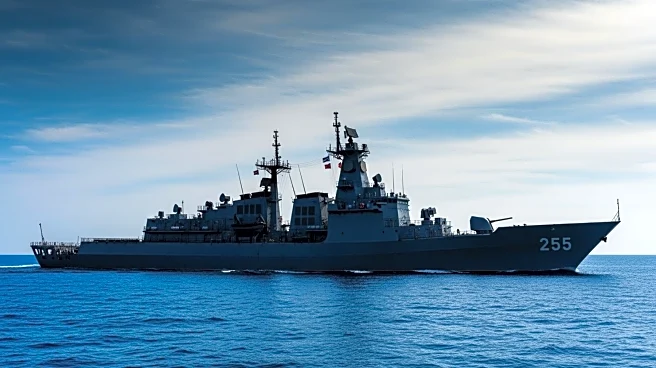What's Happening?
A Russian naval flotilla, including the frigate Marshal Shaposhnikov, the corvette Gremyashchy, and the large sea tanker Boris Butoma, has arrived in the South China Sea, docking at the port of Da Nang in Vietnam. This deployment is part of Russia's ongoing
Asia-Pacific mission, which began in early October from Vladivostok. The Russian Embassy described the visit as friendly, with planned meetings between Russian and Vietnamese naval representatives. The deployment comes amid unresolved sovereignty disputes in the South China Sea, where Russia's presence may indicate support for China in its territorial conflicts with the Philippines, a U.S. ally.
Why It's Important?
The arrival of Russian naval forces in the South China Sea highlights the strategic dynamics in Southeast Asia, where the U.S. and China are vying for influence. Russia's presence could bolster China's position in territorial disputes, potentially affecting U.S. interests in the region. This move also underscores Russia's intent to maintain a military presence in the Pacific despite its ongoing conflict in Ukraine. The deployment may strengthen Russia's diplomatic ties with Southeast Asian nations, particularly Vietnam, which has historically relied on Russian military equipment but is increasingly engaging with both the U.S. and China.
What's Next?
The Russian naval task group's continued deployment in Southeast Asia is expected to enhance Russia's diplomatic efforts in the region, potentially leading to increased cooperation in maritime infrastructure and shipbuilding with Vietnam. As Russia faces Western sanctions due to its actions in Ukraine, strengthening ties with Southeast Asian countries could provide economic and strategic benefits. The situation may also prompt reactions from the U.S. and its allies, who are closely monitoring the geopolitical shifts in the region.
Beyond the Headlines
Russia's strategic maneuvers in Southeast Asia could have long-term implications for regional security and economic partnerships. The deployment may influence Vietnam's military procurement decisions and its balancing act between major powers. Additionally, Russia's actions could affect the perception of its role in global geopolitics, particularly in regions where it is seen as a counterbalance to Western influence.















